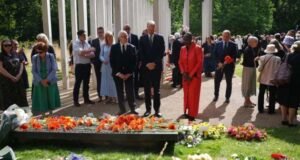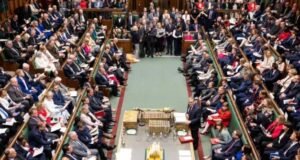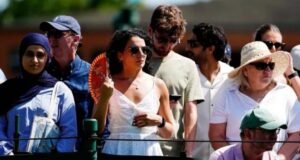
Party says leader had been attending memorial to Palestinian airstrike victims
Labour has hit out at what it said were “false and misleading” claims about Jeremy Corbyn’s visit to the Palestinian cemetery in Tunis and insisted he had attended an annual memorial for victims of an Israeli air attack on the Palestine Liberation Organisation headquarters in October 1985.
The party offered its most complete version of events yet about Corbyn’s controversial visit in 2014, and said the commemoration for the 74 people who had died was attended by “mainstream leaders”, including a Palestinian authority minister.
“None of those who carried out the Munich massacre are buried in the Palestinian cemetery at Tunis and there was no ceremony held for them,” a Labour spokesman said as the party tried to dampen the row generated by the trip.
Controversy about Corbyn’s trip to the Tunisian capital for a conference and to the Palestinian cemetery surfaced on Saturday, when it was reported he was present at an event when a wreath was laid by a grave of a PLO leader who was believed to be a mastermind of the Black September terror group.
The Labour leader reiterated on Tuesday that he was at the event in the cemetery only to commemorate victims of the airstrike. Expressing frustration, Corbyn said: “I laid one wreath along with many other people in memory of all those who died in the awful attack in 1985, which – I keep repeating and you seem not to understand – was condemned by the whole world.”
A Labour spokesman said: “Claims made about Jeremy Corbyn’s visit to the Palestinian national cemetery outside Tunis in 2014 have been both false and misleading. He attended a conference on Palestine in Tunis at the invitation of the Tunisian president with other European parliamentarians, including a Conservative and Liberal Democrat from the UK.”
The spokesman added that a delegation from the conference “went to commemorate and lay a wreath at the cemetery in memory of the dozens of Palestinians and Tunisians, including civilians, killed at the site by an Israeli air attack in 1985, condemned at the time by the UN”.
The row about Corbyn’s visit surfaced when the Daily Mail published a picture on Saturday of Corbyn holding a wreath near the grave of Salah Khalaf, who was assassinated in Tunis in 1991. Khalaf, also known as Abu Iyad, was the PLO’s second in command, and has been described as the mastermind of Black September, which was behind the Munich Olympics terror attack in 1972.
On Monday, Corbyn said he was present but not involved at a wreath layingfor Khalaf and other senior PLO associates triggered a row with the Israeli prime minister, Benjamin Netanyahu, who said Corbyn’s actions deserved “unequivocal condemnation”.
Labour said that some of those buried at the cemetery, including Khalaf and Atef Bseiso, were senior political figures in the PLO. The party said that “both have been accused by Israel of having had links with Black September in the early 1970s, though they always denied it, as has the PLO. Both were senior Fatah and PLO leaders of the time, and Palestinian officials continue to pay respects to them.”
The spokesman added: “Jeremy did not take part in laying wreaths on their graves.” The party said the wreath the Labour leader was pictured holding was for victims of the 1985 air strike and its decorative ribbon says in Arabic “monitoring the Palestinian legal and political issue” and that was the title of the conference he was attending.
The conference in Tunisia was also attended by Lord Sheikh, a Conservative peer, and Lord Phillips of Sudbury, a Liberal Democrat. Sheikh said that he had only attended the conference, did not join the delegation to the cemetery and was only aware of Corbyn’s presence when he arrived at the event.
Sheikh declared the trip on his register of interests in 2014, but Corbyn did not. Labour said that Corbyn stayed for two nights and that the value of the trip, including flight and accommodation, was less than the financial threshold required for a declaration.
Corbyn’s presence at the event was criticised by the Conservatives. Jeremy Hunt, the foreign secretary, tweeted: “If Jeremy Corbyn thinks terrorism is justified for the causes he believes in, how would he as prime minister have the moral authority to condemn terrorist murders of British citizens? Unbelievable and shocking.”
But the Labour leader won support from Palestine’s ambassador to the UK, who said that the then-Labour MP was in Tunis to commemorate “a blatant act of Israeli violence and aggression” when he was present at the wreath-laying ceremony.
In a statement, Manuel Hassassian said: “At the ceremony, Mr Corbyn stands with Palestinian authority officials including Dr Mohammed Shtayyeh. He takes part in a ceremony of remembrance for those brutally killed.”
The ambassador said the 1985 airstrike “could be legitimately called an act of terror and state terrorism. The attack was vigorously condemned by the UN security council, which voted in its favour 14-0. In the attack, 62 Palestinians and 12 Tunisians were killed.”
But there was concern in Israel. A column in a leading newspaper, Yedioth Ahronoth, warned on Monday that Corbyn’s actions, including a visit to the “grave of the person who planned the terror attack at the Munich Olympics”, were of deep concern.
“The paradox is that the least antisemitic country in Europe is liable to fall into the hands of an antisemitic politician,” wrote Ben-Dror Yemini. “Up until recently, the biggest concern was that this would be as a result of the rise of one of the extreme rightwing parties. As of now, the chance is much greater is that this will come from the left of all places.”
Israel’s Labor party secretary general, Yehiel Bar, said: “The grave new discoveries about Corbyn are no surprise, to my regret, and they only further justify the Labor party’s decision from several months ago to completely sever all ties with Mr Corbyn and his office.”
A Labour spokesman said: “Jeremy’s presence at the Tunis conference and the ceremony at the cemetery is a mark of his long and principled commitment to the struggle for Palestinian rights. That should be a matter for respect, not condemnation.”
 Weekly Bangla Mirror | Bangla Mirror, Bangladeshi news in UK, bangla mirror news
Weekly Bangla Mirror | Bangla Mirror, Bangladeshi news in UK, bangla mirror news







